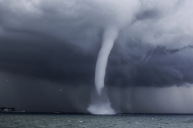With severe weather like Hurricane Helene and Hurricane Milton hitting Florida recently, many people wonder why this is happening. What causes a hurricane? The more that we unravel about this mystery, the more we can learn about how to better prepare for and possibly storm these storms from devastating towns.
What Causes Hurricanes?

Shutterstock Photo by Triff
If you have ever wondered what causes a hurricane, you are not alone. Luckily for us, Oceanservice has the answers. Hurricanes are powerful weather events that "suck heat fro topical waters" and use it to fuel them. Hurricanes often begin by forming over the water.
When hurricanes begin, they begin in low pressure areas and enhance the chance of showers and thunderstorms. Then, "As this weather system moves westward across the tropics, warm ocean air rises into the storm, forming an area of low pressure underneath."
The change in pressure causes air to rush in and then that air rises and cools. This is what forms clouds and thunderstorms. From there "Water condenses and forms droplets, releasing even more heat to power the storm." So what is the difference between a bad thunderstorm and a hurricane?
Well, in order to be classified as a hurricane the wind speeds need to reach 74mph. Similarly the term hurricane refers to a specific type of storm. Specifically, a hurricane is "A rotating, organized system of clouds and thunderstorms that originates over tropical or subtropical waters and has closed, low-level circulation." In simple terms, the sun's heat and Earth's rotation leads to hurricanes.
How Does This Knowledge Help Us?
While many hope that knowing what causes hurricanes will give us the knowledge to stop them, it has yet to occur. Scientists have been trying for decades to learn how to weaken or fully prevent hurricanes, but the attempts have failed thus far. While you cannot stop a hurricane from forming, you can prepare for one and help mitgate the chance of dealing with serious damage.
FEMA shares the following tips for avoiding hurricane damage.
- Know Your Risk: when buying a home or property know what the risk of hurricane is in that area and arm yourself with knowledge.
- Buy Flood Insurance: hurricanes often lead to flooding, by having flood insurance you can have faster recovery if damage is done to your home during the storm.
- Install Hurricane Straps: "Hurricane straps (made of galvanized metal) help keep the roof fastened to the walls in high winds."
- Install And Maintain Storm Shutters: Installing these is one of the best ways to protect your home from violent hurricanes.
- Install A Generator: This can help with power outages that often follow hurricanes.
- Reinforce Your Garage Door: Garage doors often suffer or fly off completely in hurricanes high winds, reinforce the door to prevent this from happening.
- Anchor Potential Winddborn Objects: Trash cans, grills, and yard furniture can turn deadly quickly. Secure them and anchor the storage shed to the ground.
- Remove Trees That Could Fall On Your Home: Beat the hurricane to it and remove trees that could fall in the high winds and damage your home.
- Use Govdelivery: Use this to receive updates about "flood insurance, mitigation, individual assistance, disaster declarations, and much more."




